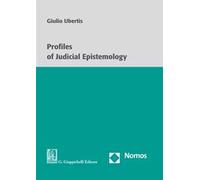
Profiles of judicial epistemology
Profiles of judicial epistemology

Prezzo totale più basso
3-4 giorni lavorativi
PayPal
PayPal
Visa
Visa
Mastercard
Mastercard
52,25 €
Spedizione gratuita
Profiles of judicial epistemology

Prezzo totale più basso
Controllare disponibilità nello shop
PayPal
PayPal
Visa
Visa
Mastercard
Mastercard
Bonifico anticipato
Bonifico anticipato
52,25 €
Spedizione gratuita
Profiles of judicial epistemology - Dettagli
▶ Trova sempre il prezzo più conveniente!
Abbiamo trovato 2 prezzi per Profiles of judicial epistemology La nostra lista dei prezzi è sempre trasparente e visualizzata in ordine crescente di prezzo. Possono aggiungersi costi di spedizione.
Profiles of judicial epistemology - Informazioni sul prezzo
- Prezzo più basso: 52,25 €
- Il prezzo più basso è offerto dallo shop lafeltrinelli.it . Lì puoi effettuare l'ordine per l'offerto.
- Con un totale di 2 offerte, la variazione di prezzo per Profiles of judicial epistemology oscilla tra 52,25 €€ - 52,25 €€.
- Metodi di pagamento: lafeltrinelli.it accetta PayPal, Visa, Mastercard.
- Consegna: il tempo di consegna più veloci è offerto dallo shop lafeltrinelli.it con 3-4 giorni lavorativi giorni lavorativi.
Non dimenticarti del tuo codice sconto:
Segnala violazione
State per segnalare una violazione legale sulla base della Legge sui servizi digitali dell'UE.